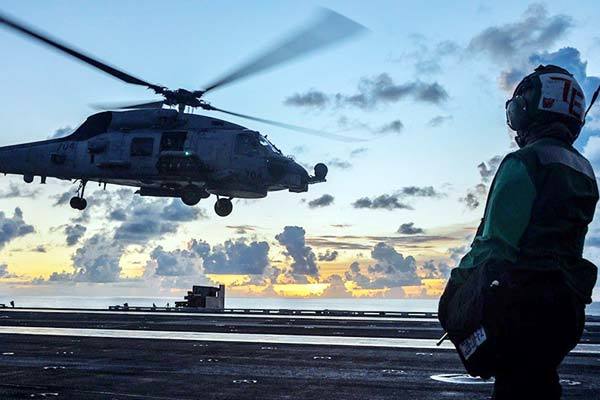- Stability of China-US relations is conducive to world stability.
- China does not stand still watching some American politicians with prejudice and hostility against China.
- China always maintains a high level of stability and continuity in developing relations with the US.
Chinese pilots and officers have been ordered to exercise restraint in increasingly frequent confrontations with US aircraft and warships. The Defense Ministers of the two countries had a phone call as suggested by the US side.
The two countries and 19 other countries have joined the Code for Unplanned Encounters at Sea (CUES) with a standardized protocol for safety procedures.
A new-style Cold War
 |
|
US Treasury Secretary Steven Mnuchin and Chinese Vice Premier Liu He during trade talks. Photo: Bloomberg
|
Like the Covid-19 pandemic, the US-China competition has no vaccine yet, and living with it is unavoidable. Governance of competition to prevent conflict is a prerequisite that both need to work towards.
The tension between the US and China is not the old-fashioned Cold War between the Soviet Union and the US because it still has dissident monitoring and control mechanisms. A hot war is not inevitable because history shows that power shifts do not always cause war. The US-China competition is "a new type of cold war, with cold and hot times" and under control.
Some actions are "in the plan". The US will try to increasingly use a combination of economic and legal diplomacy measures to limit China's excesses.
This war affects international cooperation in solving regional and global issues. The two sides' retaliation measures cannot help but affect countries in the East Sea region.
Visa restrictions and a ban on 24 Chinese companies that "helped the Chinese military build and militarize internationally condemned artificial islands in the East Sea" have made countries in the region not only happy, as international law violations are gradually punished, but also worried, as the US is pressing countries to take similar support measures, as these Chinese companies have a great influence on their economic projects.
ASEAN Declaration
 |
|
China was condemned for the militarization of artificial islands in the East Sea |
Facing activities at sea as well as statements to promote the policies of the US and China, on August 8, at the request of Vietnam - as the Chair of ASEAN - and Indonesia, the ASEAN Foreign Ministers issued a Joint Declaration on the Importance of Maintaining Peace and Stability in Southeast Asia on the occasion of its 53rd anniversary.
ASEAN emphasized that countries inside and outside the region need to respect international law in order to ensure peace and stability in the region, emphasizing ASEAN's "neutral" position, ASEAN's central role, "multilateralism", "no use of force", and "international laws". The only right choice for regional countries in the US-China competition is national interests and international law.
On August 26 and August 31, responding to China’s maneuvers, firing of real bullets and ballistic missiles in the East Sea, Vietnam said: "Vietnam's consistent view is that all activities in Vietnam’s Hoang Sa (Paracel) Islands and Truong Sa (Spratly) Islands without Vietnam's permission are in violation of Vietnam's sovereignty over these two archipelagos, and this is not conducive to peace, stability, order, security, safety and free air and maritime navigation in the East Sea."
On August 26, the Vietnamese government issued a decree on sanctioning illegal exploitation in Vietnam's waters. Given the complex context in the East Sea, Vietnam's choices are national interests and international law.
Nguyen Hong Thao

Three scenarios for US-China competition
Entering the third quarter of the year, US-China tensions have become increasingly fierce, in all aspects from trade and human rights to the fight against the Covid-19 pandemic, issues related to the East Sea, and closure of technology firms.